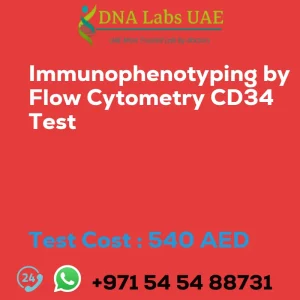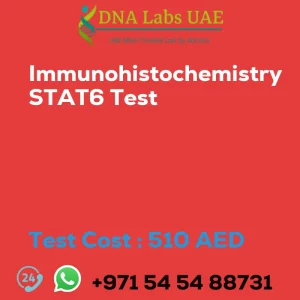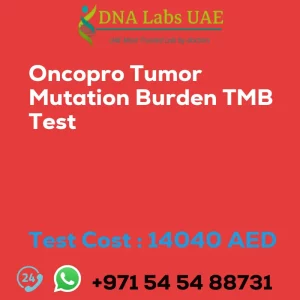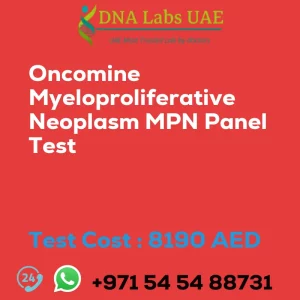IMMUNOHISTOCHEMISTRY ARGINASE-1 Test
At DNA Labs UAE, we offer the IMMUNOHISTOCHEMISTRY ARGINASE-1 test to help diagnose and study various diseases, particularly cancer. This blog post will provide detailed information about the test, including its cost, symptoms, diagnosis, and more.
Test Details
The IMMUNOHISTOCHEMISTRY ARGINASE-1 test is an immunohistochemistry (IHC) technique that detects and visualizes the arginase-1 protein in tissue samples. Arginase-1 is an enzyme involved in the urea cycle, which is responsible for detoxifying ammonia in the body. It is primarily found in the liver but can also be present in other tissues like the kidney, lung, and immune cells.
The test involves staining tissue sections with specific antibodies that bind to arginase-1. These stained sections are then examined under a microscope to detect the presence of the target protein using a chromogenic or fluorescent signal.
The IMMUNOHISTOCHEMISTRY ARGINASE-1 test is commonly used in research and diagnostic settings to assess the expression of arginase-1 in various tissues. It can provide valuable insights into the presence and distribution of arginase-1 in normal and diseased tissues.
Test Components and Price
The IMMUNOHISTOCHEMISTRY ARGINASE-1 test is available at a cost of 510.0 AED. This includes the analysis of the tissue sample and the generation of a detailed report.
Symptoms and Diagnosis
The IMMUNOHISTOCHEMISTRY ARGINASE-1 test is typically recommended by oncologists to diagnose and study cancer. Increased expression of arginase-1 has been observed in certain types of cancer, such as hepatocellular carcinoma and melanoma.
To undergo the test, you need to submit a tumor tissue sample in either 10% Formal-saline or a formalin-fixed paraffin-embedded block. The sample should be shipped at room temperature. Additionally, you need to provide a copy of the histopathology report, the site of biopsy, and the clinical history.
Report Delivery
The report for the IMMUNOHISTOCHEMISTRY ARGINASE-1 test is delivered on a daily basis by 6 pm. The delivery time may vary depending on the complexity of the tissue sample:
- Report for a tissue biopsy: 5 days
- Report for a tissue block: 5 days
- Report for a large complex tissue: 7 days
Test Department and Doctor
The IMMUNOHISTOCHEMISTRY ARGINASE-1 test is conducted in the Histology department at DNA Labs UAE. The test is typically recommended and supervised by an oncologist.
Pre Test Information
Prior to undergoing the IMMUNOHISTOCHEMISTRY ARGINASE-1 test, it is important to provide a copy of the histopathology report, the site of biopsy, and the clinical history. This information helps in the accurate interpretation of the test results.
Overall, the IMMUNOHISTOCHEMISTRY ARGINASE-1 test offered by DNA Labs UAE is a valuable tool for studying the expression and localization of arginase-1 in tissues. It can provide important insights into various biological and pathological processes, particularly in cancer research and diagnosis.
| Test Name | IMMUNOHISTOCHEMISTRY ARGINASE-1 Test |
|---|---|
| Components | |
| Price | 510.0 AED |
| Sample Condition | Submit tumor tissue in 10% Formal-saline OR Formalin fixed paraffin embedded block. Ship at room temperature. Provide a copy of the Histopathology report, Site of biopsy and Clinical history. |
| Report Delivery | Sample Daily by 6 pm; Report Block: 5 days Tissue Biopsy: 5 days Tissue large complex : 7 days |
| Method | Immunohistochemistry |
| Test type | Cancer |
| Doctor | Oncologist |
| Test Department: | HISTOLOGY |
| Pre Test Information | Provide a copy of the Histopathology report, Site of biopsy and Clinical history. |
| Test Details |
Immunohistochemistry (IHC) is a technique used to detect and visualize specific proteins in tissues using antibodies. The arginase-1 (ARG1) test is an IHC test that specifically detects the presence of the arginase-1 protein in tissue samples. Arginase-1 is an enzyme that plays a role in the urea cycle, which is responsible for the detoxification of ammonia in the body. It is predominantly expressed in the liver, but can also be found in other tissues such as the kidney, lung, and immune cells. The ARG1 test is commonly used in research and diagnostic settings to assess the expression of arginase-1 in various tissues. It can be helpful in determining the presence and distribution of arginase-1 in normal and diseased tissues. For example, increased expression of arginase-1 has been observed in certain types of cancer, such as hepatocellular carcinoma and melanoma. The IHC technique involves staining tissue sections with specific antibodies that bind to the target protein (in this case, arginase-1). The tissue sections are then visualized under a microscope, and the presence of the target protein is detected through the use of a chromogenic or fluorescent signal. Overall, the immunohistochemistry arginase-1 test is a valuable tool for studying the expression and localization of arginase-1 in tissues, and it can provide important insights into various biological and pathological processes. |








